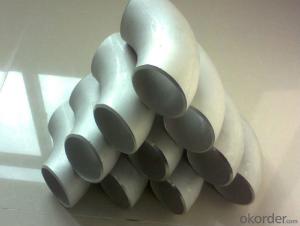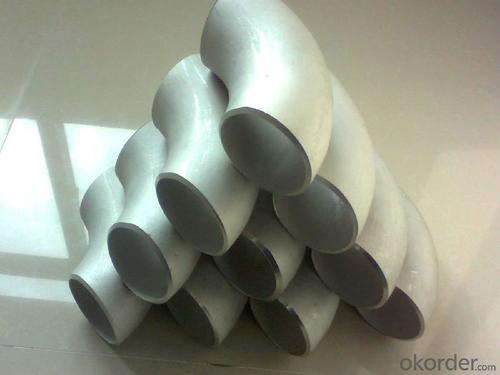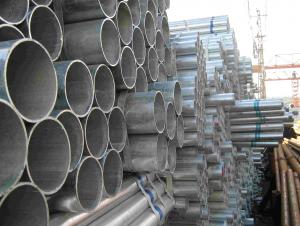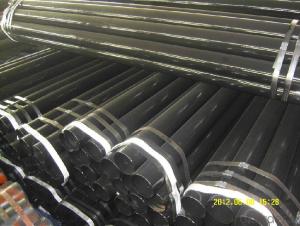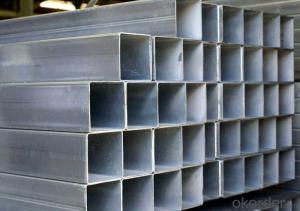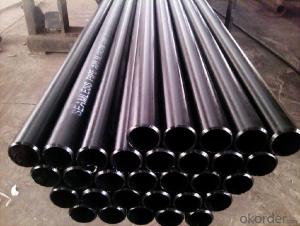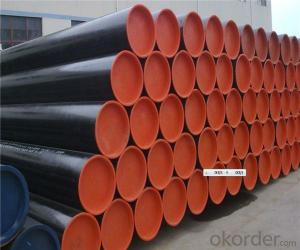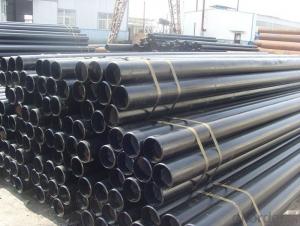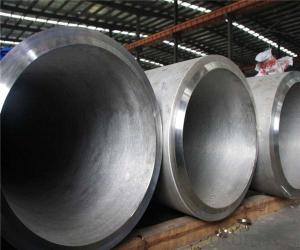Ansi ,Din,jis Stainless Steel Elbow from CNBM
- Loading Port:
- Tianjin
- Payment Terms:
- TT OR LC
- Min Order Qty:
- 100 m.t.
- Supply Capability:
- 3000 m.t./month
OKorder Service Pledge
OKorder Financial Service
You Might Also Like
Product Description:
1、 Structure of Ansi ,Din,jis Stainless Steel Elbow Description:
Stainless Steel Elbow is a kind of common pipe fitting used to switch the directions of pipelines in the pipe system. It can allow the pipeline to make a turn at an angle. The features of stainless steel can provide some benefits for the elbow. Because of the chromium content, the stainless steel elbow can be used for longer time. The stainless steel elbow can be widely used in various industries equipments.
2、Main Features of Ansi ,Din,jis Stainless Steel Elbow:
Relatively light weight
Optional torsional strength
Support high pressure
Resist corrosion
Reasonable price
3、 Ansi ,Din,jis Stainless Steel Elbow Images:
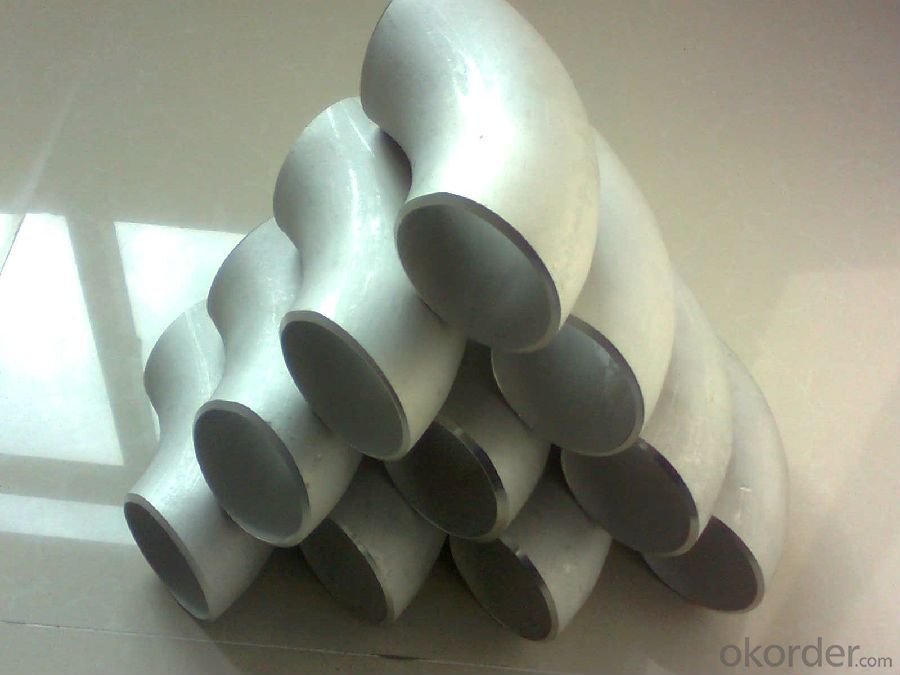
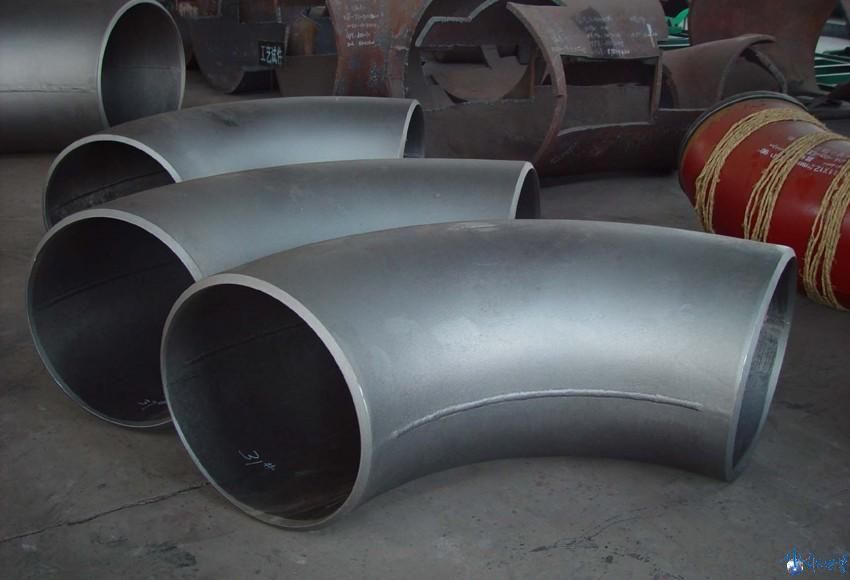
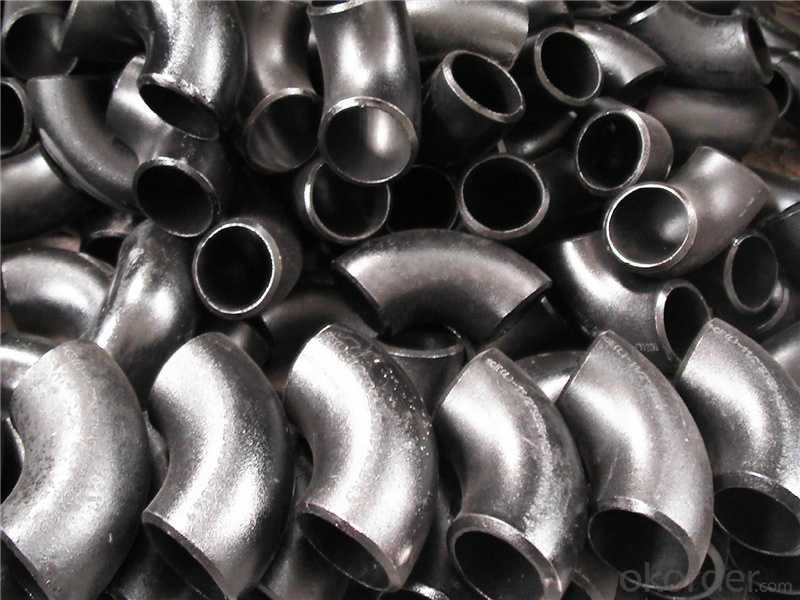
4、 Ansi ,Din,jis Stainless Steel Elbow Specification:
HOT SALE elbow
1 Radius:1D-3D
2 size: DN15~DN1800
3.Thickness : 2.8~60mm.
4.Certificate : ISO9001:2000 ,API.
FIRST :the information of our company
we specialize in this field for 14 years, Existing staff more than 300 people, fixed assets of 4 million dollars, current assets 8 million dollars, My company more than 90% for exports,.We have passed ISO9001:2000, API certifications.
SECOND :the standard of the products
Standard: | ANSI B16.9/16.28,ASME B36.10M-1996. |
JIS P2311 /2312/2313 SGP | |
DIN 2605 / 2615/2616/2617 | |
GOST 17379-2001 /17375-2001 /30753-2001/17378-2001 | |
API | |
BS | |
EN | |
GB |
Elbow | DN15~DN1800 |
Flange | DN~DN4000 |
Tee | DN15~DN1800 |
Reducer | DN15~DN1800 |
Cap | DN15~DN1800 |
Seamless Steel pipe | DN15~DN600 |
ERW | DN15~DN1800 |
SSAW | DN200~DN3600 |
LSAW | DN300~DN1400 |
Wall thickness | SCH10-XXS |
THIRD :the information of the products
Stainless steel elbow | |
Other productions: | butt welded and seamless pipe fittings , such as tee, cross, cap, bend, 45D/90D/180D LR/SR elbow. |
Material: | Carbon steel (ASTM A234WPB, A234 WPC , A420 WPL6 ). St45.8 A105 A106 STPG42 |
Stainless steel (ASTM A403 WP304/WP304L/WP316/WP316L). | |
Alloy steel (ASTM A234 WP12/WP11/WP22/WP5/WP9/WP91). | |
Size: | Seamless elbow:1/2"~24" DN15~DN600 |
Welded Elbow: 1/2”~72" DN15~DN1800 | |
Thickness: | SCH10~SCH160,STD ,XS ,XXS sch5s, sch20s, sch40s, sch80s,SGP./ 2.8mm~60mm |
Surface treatment: | Transparent oil, rust-proof black oil hot galvanized |
Productivity: | 1000 T/month |
Min order: | 100pieces |
Delivery Term: | FOB(30deposite the balance before shipment) CIF or C&F(30% deposite , the balance aginst with the copy of B/L) |
Remark: | 1. Special design available according to requirement 2. All the production process are made under the ISO9001:2000 ,API,CCS |
5、FAQ of Ansi ,Din,jis Stainless Steel Elbow
①How to guarantee the quality of the products?
We have established the international advanced quality management system,every link from raw material to final product we have strict quality test;We resolutely put an end to unqualified products flowing into the market. At the same time, we will provide necessary follow-up service assurance.
②How long can we receive the product after purchase?
In the purchase of product within three working days, We will arrange the factory delivery as soon as possible. The pecific time of receiving is related to the state and position of customers.
③ How can we get more information?
You can contact us by Email or call us directly and we will do our best to give you valuable information as much as possible but this service is not available on weekends.
- Q: What is the maximum diameter of steel pipes?
- The maximum diameter of steel pipes can vary depending on the specific manufacturing capabilities, but generally, it can range from a few inches to several feet.
- Q: How are steel pipes protected against mechanical damage during transportation?
- Various measures are implemented to safeguard steel pipes against mechanical damage during transportation. One commonly used technique involves the application of protective coatings or wrapping materials, typically composed of plastic, rubber, or epoxy. These coatings serve as a physical barrier, shielding the pipes from scratches, dents, and other forms of mechanical harm. Another method involves the utilization of padding or cushioning materials, such as foam inserts or rubber gaskets. These materials are inserted inside or wrapped around the pipes, absorbing any impacts or shocks that may occur during transportation. This effectively prevents potential damage caused by vibrations or bumps. Additionally, steel pipes are frequently secured and immobilized within transportation containers through the use of straps, braces, or other securing devices. These measures ensure that the pipes remain stable and do not collide with one another, thereby minimizing the risk of mechanical harm. Furthermore, proper handling and loading techniques play a crucial role in protecting steel pipes during transportation. This involves the utilization of appropriate lifting equipment, such as cranes or forklifts, to prevent any accidental dropping or mishandling of the pipes. Moreover, pipes are often stored or stacked in a manner that minimizes the possibility of deformation or bending. Ultimately, a combination of protective coatings, cushioning materials, securement devices, and proper handling techniques are employed to ensure the safe transportation of steel pipes and maintain their optimal condition for use in various applications.
- Q: Can steel pipes be used for wastewater disposal?
- Yes, steel pipes can be used for wastewater disposal. Steel is a durable and corrosion-resistant material, making it suitable for transporting and disposing of wastewater safely and efficiently.
- Q: How do you calculate the pipe head loss for steel pipes?
- The Darcy-Weisbach equation is utilized for calculating the pipe head loss in steel pipes. This equation establishes a connection between the head loss (hL) and various factors such as the flow rate (Q), pipe diameter (D), pipe length (L), fluid density (ρ), fluid velocity (V), and the friction factor (f). The formula can be expressed as: hL = (f * (L/D) * (V^2))/(2g) Where: - The head loss (hL) is measured in meters - The friction factor (f) is dimensionless - The pipe length (L) is measured in meters - The pipe diameter (D) is measured in meters - The fluid velocity (V) is measured in meters per second - The acceleration due to gravity (g) is typically taken as 9.81 m/s^2 The friction factor (f) relies on the Reynolds number (Re) of the flow, which is a dimensionless quantity representing the ratio of inertial forces to viscous forces. The Reynolds number can be calculated using the following equation: Re = (ρ * V * D) / μ Where: - The Reynolds number (Re) is dimensionless - The fluid density (ρ) is measured in kg/m^3 - The fluid velocity (V) is measured in meters per second - The pipe diameter (D) is measured in meters - The dynamic viscosity of the fluid (μ) is measured in Pa·s or N·s/m^2 The friction factor (f) can be obtained from empirical correlations or from Moody's diagram, which establishes a connection between the Reynolds number, the relative roughness of the pipe surface, and the friction factor. By substituting the calculated friction factor (f) and other known values into the Darcy-Weisbach equation, the head loss in the steel pipe can be determined. It is important to note that the head loss represents the energy lost due to friction and other factors and is usually expressed in terms of pressure drop or height difference.
- Q: Can steel pipes be used for hydropower systems?
- Hydropower systems can indeed utilize steel pipes. For a variety of purposes in these systems, steel pipes are commonly employed, particularly for penstocks, which facilitate the transportation of water from a reservoir to a turbine. The strength, durability, and capacity to withstand high pressure and water flow make steel pipes a preferred option. Additionally, their resistance to corrosion ensures their suitability for long-term usage in hydropower systems. Moreover, the ease of welding or joining steel pipes enables flexibility in system design and installation. In summary, steel pipes are a dependable and extensively utilized alternative for hydropower systems.
- Q: What are the different types of steel pipe joints for underwater applications?
- There are various types of steel pipe joints commonly used for underwater applications, including buttweld joints, socket weld joints, and threaded joints. These joints provide secure connections and maintain the integrity of the pipeline system in underwater environments.
- Q: How to establish a concrete-filled steel tubular column model in ANSYS?
- A two unit model or a composite unit model can be adoptedTwo units are constructed of steel tubes and concreteA composite unit may be either a fiber element or a section conversion attribute
- Q: How are steel pipes affected by international trade policies?
- Steel pipes can be significantly impacted by international trade policies. These policies can include tariffs, quotas, and other trade barriers that affect the import and export of steel pipes. Changes in trade policies can lead to fluctuations in prices, supply, and demand for steel pipes. Additionally, trade policies can also influence the competitiveness of domestic steel pipe producers in the global market.
- Q: Why should the weak electricity be pre buried with galvanized steel pipe?
- Galvanized steel pipe mainly because of anti-interference and electrical connectivity, to prevent other strong magnetic strong signal to interfere with weak signal, while in the electrical connection, galvanized steel pipe can be directly connected to the bridge.
- Q: Can steel pipes be bent or shaped?
- Yes, steel pipes can be bent or shaped using various techniques such as cold bending, hot bending, or by using specialized machinery like pipe benders.
Send your message to us
Ansi ,Din,jis Stainless Steel Elbow from CNBM
- Loading Port:
- Tianjin
- Payment Terms:
- TT OR LC
- Min Order Qty:
- 100 m.t.
- Supply Capability:
- 3000 m.t./month
OKorder Service Pledge
OKorder Financial Service
Similar products
Hot products
Hot Searches
Related keywords
